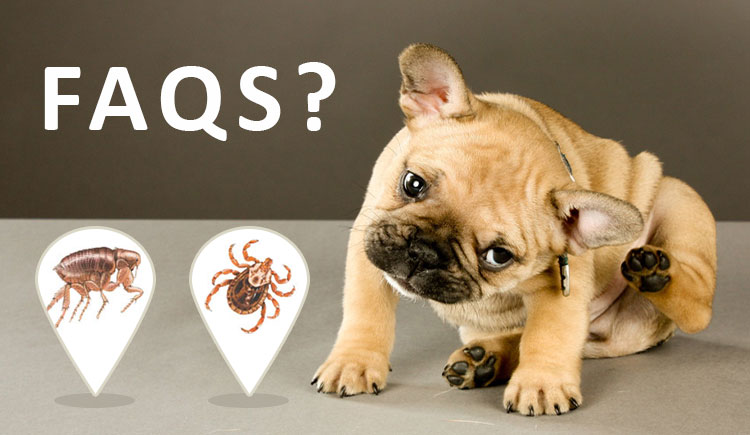When you notice your canine constantly scratch and bite his or her fur, be sure it is either the dreaded fleas or ticks. These pesky critters tend to cause havoc to your poor pal and make him or her feel uncomfortable and uneasy. Since fleas and ticks are all throughout the year, it is important for pet parents, especially the new pet parents to know about these creatures, and what damages they can do. Thus, with regards to this, we have selected a few frequently asked questions related to fleas, ticks and, flea infestations and have answered them.
FAQs Relating to Fleas, Ticks and Flea Infestations
Q: What are fleas and ticks?
A: Fleas and ticks are external parasites that tend to transmit diseases and major health problems. They feed on blood and leave red marks all around by causing irritating bites. While ticks are difficult to identify due to their tiny size, fleas can easily be spotted with the naked eye. Furthermore, ticks have a much longer lifespan than fleas, and though they go hand in hand, they’re pretty different from each other. But both of them are equally harmful to your pal and must not be left untreated.
Q: What is flea infestation?
A: Flea infestation literally means an infestation of fleas. It could be a heavy infestation of fleas in your furry pal as well as in your home. The signs of flea infestation are as follows:
- Excessive licking, biting, scratching of fur by your fur buddy.
- Fleas hopping here and there in an around your home.
- Several dot-like insects on your furry pal’s fur.
Moving on to the how’s…
Q: How to know if a dog has fleas or ticks?
A: Spotting fleas and ticks on your buddy’s fur can be both difficult and tricky, but it is important to spot them as quickly as possible. Below is a list that will aid you in confirming whether or not your buddy has the dreaded parasite infection.
- Persistent scratching, itching, biting of fur.
- Red bumps or sores on the body.
- Black specks over the skin.
- Hair loss.
- Scaly and pale skin.
- Loss in appetite.
Q: How do dogs get fleas and ticks and how to get rid of them?
A: There are several ways by which a dog can get infected by fleas and ticks.
- From an infected animal.
- From your unclean yard.
- From various places in and around your neighborhood.
- From consuming unwanted things.
So how does one get rid of these creepy critters? Well, the simplest way to get rid of them is by visiting your local vet or any other vet. The vet will then examine your Fido and confirm it before advising you on which flea and tick treatment to opt for. Some of the highly renowned flea and tick treatment include Seresto Collars, Frontline Top Spot, Effipro Spray, Ultrum flea and tick powder, etc.
Q: How to prevent fleas and ticks from infecting dogs?
A: Follow these basic pointers to prevent fleas and ticks from harming your pet. Please note that these steps do not guarantee you 100% results, but drastically reduces the chances of parasites infecting your pal.
- Keep your house, yard and surrounding areas clean at all times.
- Keep your pet on a monthly flea and tick preventative plan.
- Groom your buddy every now and then.
- Visit the vet frequently for regular check-ups.
A few more questions…
Q: Is monthly flea and tick treatments necessary even if dogs do not have fleas and ticks?
A: YES! Even if your furry buddy is not infected with fleas and ticks, you should keep him on a monthly flea and tick preventative schedule. As they say, prevention is better than cure, so why take any chances? After all, he is your munchkin, and you should do your best to protect him.
Q: Should pet parents cease worrying about fleas and ticks when it begins getting cold?
A: As pet parents, you can never stop worrying about your pal, especially as far as fleas and ticks are concerned. Even during the cold wintery months, these creatures can harm your ball of fur. Thus, no matter how cold the weather gets, flea and ticks can harm your canine, so stay prepared.
We hope the above FAQs about fleas and ticks have given pet parents a fair idea about these pesky critters and how dangerous they can be. Hence, it is important to protect your buddy at all times, even if he is hale and hearty. He needs your protection, and we’re sure you’re giving him that!





